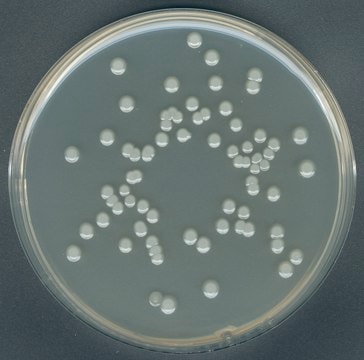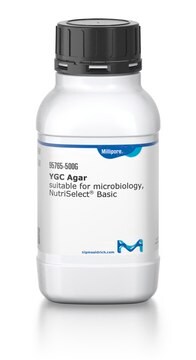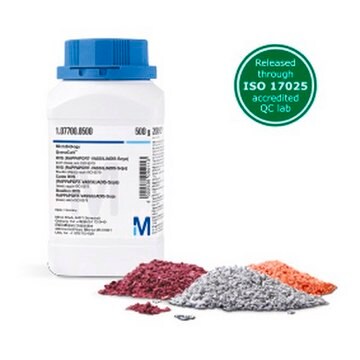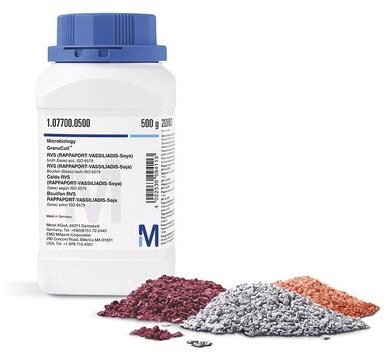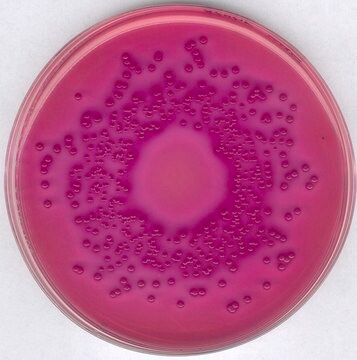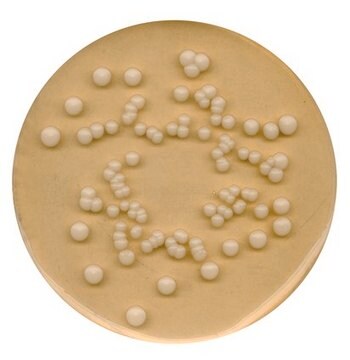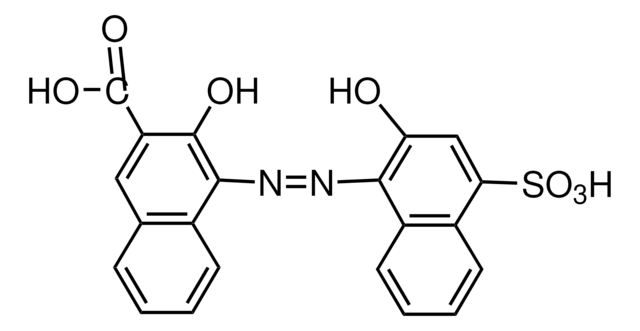1.16000
GranuCult® plus Yeast extract glucose chloramphenicol agar FIL-IDF
for yeasts, for molds, suitable for microbiology
Synonym(s):
YGC agar, Yeast extract glucose chloramphenicol agar
Sign Into View Organizational & Contract Pricing
All Photos(1)
About This Item
UNSPSC Code:
41106213
Recommended Products
form
medium granules (dehydrated (DCM))
Quality Level
manufacturer/tradename
GranuCult® plus
storage condition
dry media (Keep tightly closed)
technique(s)
microbiological culture: suitable
color
yellow-brown
pH
6.6 (25 °C, 40 g/L in H2O)
application(s)
food and beverages
microbiology
storage temp.
15-25°C
suitability
molds
yeasts
General description
GranuCult® plus YGC agar is a selective agar used to isolate yeasts and molds from milk and milk products. The culture medium contains chloramphenicol to suppress accompanying bacterial flora. Unlike other similar culture media with antibiotics (e.g., Oxytetracycline Glucose Yeast Agar), it has the advantage of being fully autoclavable. Once prepared, it is stable for a long time - at least 4 months.
Application
GranuCult® plus YGC agar is suitable for Selective agar for isolating and counting yeasts and molds in milk and milk products.
Features and Benefits
- GranuCult® offers superior granulated culture media.
- Safe and sustainable due to reduced risks associated with fine dust and toxic substance inhalation, resulting in a safer work environment.
- Excellent wettability, solubility, and free-flowing properties
- Convenient, with minimal component separation and clumping, even under warm or humid conditions.
- High batch-to-batch reproducibility
- Prolonged shelf life of up to five years
- High number of test strains exceeding all regulatory demands
- Granulation technology allows many supplements to be included, with no need to add these separately
Analysis Note
Appearance (color): yellowish-brown
pH-value (25 °C): 6.4 - 6.8
Recovery on test medium (Candida albicans ATCC 10231 (WDCM 00054)): ≥ 70 %
Recovery on test medium (Saccharomyces cerevisiae ATCC 9763 (WDCM 00058)): ≥ 70 %
Recovery on test medium (Saccharomyces cerevisiae ATCC 9080): ≥ 70 %
Recovery on test medium (Escherichia coli ATCC 25922 (WDCM 00013)): ≤ 0.01 %
Recovery on test medium (Bacillus cereus ATCC 11778 (WDCM 00001)): ≤ 0.01 %
Recovery on test medium (Staphylococcus aureus ATCC 25923 (WDCM 00034)): ≤ 0.01 %
Growth (Geotrichum candidum DSM 1240): good to very good
Growth (Penicillium commune ATCC 10428): good to very good
Growth (Aspergillus brasiliensis (formerly A. niger) ATCC 16404 (WDCM 00053)): good to very good
Incubation: 5 days; 28 °C; aerobic
pH-value (25 °C): 6.4 - 6.8
Recovery on test medium (Candida albicans ATCC 10231 (WDCM 00054)): ≥ 70 %
Recovery on test medium (Saccharomyces cerevisiae ATCC 9763 (WDCM 00058)): ≥ 70 %
Recovery on test medium (Saccharomyces cerevisiae ATCC 9080): ≥ 70 %
Recovery on test medium (Escherichia coli ATCC 25922 (WDCM 00013)): ≤ 0.01 %
Recovery on test medium (Bacillus cereus ATCC 11778 (WDCM 00001)): ≤ 0.01 %
Recovery on test medium (Staphylococcus aureus ATCC 25923 (WDCM 00034)): ≤ 0.01 %
Growth (Geotrichum candidum DSM 1240): good to very good
Growth (Penicillium commune ATCC 10428): good to very good
Growth (Aspergillus brasiliensis (formerly A. niger) ATCC 16404 (WDCM 00053)): good to very good
Incubation: 5 days; 28 °C; aerobic
Footnote
We offer two media types: the superior granulated GranuCult® and the cost-efficient powdered NutriSelect® culture media, depending on your needs.
The designations basic, plus, or prime are added to indicate the quality control level, from basic quality control to standard QC plus to prime for full regulatory compliance.
The designations basic, plus, or prime are added to indicate the quality control level, from basic quality control to standard QC plus to prime for full regulatory compliance.
Legal Information
GRANUCULT is a registered trademark of Merck KGaA, Darmstadt, Germany
NutriSelect is a registered trademark of Merck KGaA, Darmstadt, Germany
Storage Class Code
11 - Combustible Solids
WGK
WGK 3
Certificates of Analysis (COA)
Search for Certificates of Analysis (COA) by entering the products Lot/Batch Number. Lot and Batch Numbers can be found on a product’s label following the words ‘Lot’ or ‘Batch’.
Already Own This Product?
Find documentation for the products that you have recently purchased in the Document Library.
Customers Also Viewed
Our team of scientists has experience in all areas of research including Life Science, Material Science, Chemical Synthesis, Chromatography, Analytical and many others.
Contact Technical Service